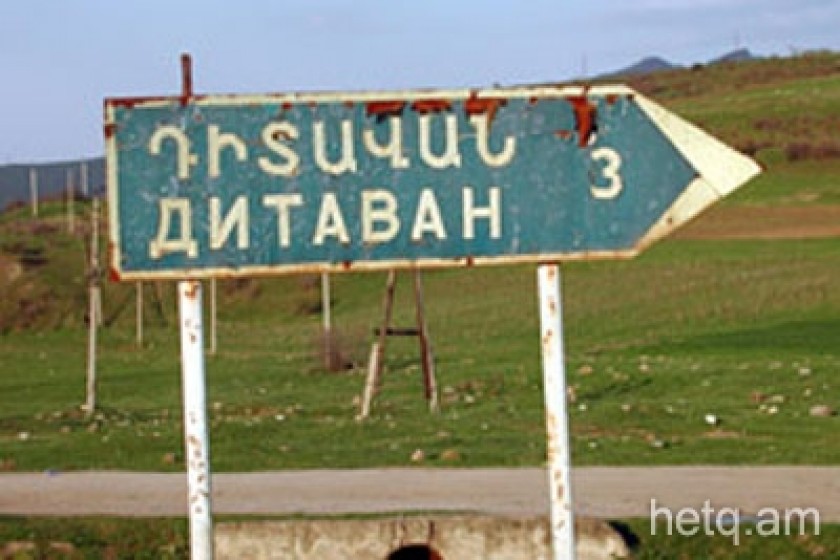
The Boys Leave Home; the Girls Remain Unmarried
The villageof Revazlunear Ijevan was at some point renamed to Ditavan ( Ditel – to watch in Armenian) due to its location at a high altitude.
All the villages and towns nearby can be seen from this village. Another obvious sight from this altitude is the Armenian-Azerbaijani border, from where the village was shelled periodically during the war.
Ditavan is one of the border villages included in the rural poverty eradication program. The village, once rich and prosperous, is in extreme poverty today. The reasons for this vary. In the 1960s and 70s, the territory of the village was used for manufacturing plants. “What did we know then? We thought that it was a good thing,” said the people of Ditavan, “We would work in those factories, get our salaries and make a living.”
Seyran Sargsyan, head of the Ditavan village administration, confirmed this: “The profits we've made through factories and through land cultivation have always been complementary.”
The factories shut down after independence, and the remaining territory was distributed among the village residents. The villagers became landowners, but instead of cultivating and making a living from their land, they were forced to leave. The population of the village dwindled, dropping to 400 from the earlier 600 residents.
“The youth leave the village. Half of those who leave return, but the other half remain out there. Some of them come back to get their families and then leave for good,” said village head Seyran Sargsyan, blaming unemployment for the emigration. “They leave mainly because there are no jobs.”
The “jobs” the village head referred to cover a wide variety of things. They include the factories that are not operating, the inefficient agriculture and the long distance to the market. “People don't have the means to cultivate their land and yield a decent harvest. You have to plough the land two or three times, cultivate it and then sow the seeds. They work it just once and sow. The money they spend is almost equal to what they get in return. They don't make a profit,” said Seyran Sargsyan.
The villagers have nothing to invest in their agriculture. Even if they did, it would seem unlikely that they would make a profit, because their technology is old. “The tractors are 30-40 years old, the plough is not effective. They cannot plough well,” added the village head. According to him, the villagers plough and sow despite knowing that they will not get a decent harvest because they do not want the land to go to waste.
No money circulates in Ditavan. They barter their harvest with goods brought in from the regional center or nearby towns. “People end up with no money in their hands to solve their problems. They can't give their children an education and end up backward,” said the village head and led us to Sergo Grigoryan's house. Why this man in particular? Because his son and two daughters have received a higher education, for which Sergo was forced to sell his 1.5 hectare fruit-bearing land.
“The times are such that the children of needy people are left without an education,” said Sergo Grigoryan, “But if they are talented, work hard and want to be educated, why should they be denied?”
In Sergo's opinion, it is impossible to live by agriculture alone. One should think about producing something. “For example, berries – cornels and blackberries – are abundant in our village. If we set up a processing plant it would give people work, and the villagers would not sell their harvest to retailers for peanuts.”
Because they are far from the market, for example, a kilogram of cornel is sold for 50 drams in the village, while it would fetch a price of 150-200 drams in the city. Sergo Grigoryan said that it was for this reason that his 1.5 hectares of fruit-bearing land did not yield a profit. “I have sold pineapples for only 60 drams because they would bring cheap things from Sadakhlo and our products would not sell.”
Sergo Grigoryan did not blame those who left the village, “What would they do if they remained? Where would they work, how would they support their families?” His son, like many others, has left forRussiato try his luck there.
“The village is ageing. We need to create conditions to keep young people in the village. We can't marry our sons. The girls remain spinsters,” said Sergo Grigoryan and, turning 360 degrees, waved his hands to indicate the neighboring houses, “There are no school-aged children in my house today, and there are none in these houses either. Sooner or later, the school will be forced to shut down.”
There was a time when the school in Ditavan had 150-160 students. Now, the narrow one-story building and the small cottages in its yard host 50-60 children, while the ones to join them soon are around three times less. There are only 17 children under the age of 6 in Ditavan.
The people I spoke with had heard of the rural poverty eradication program, but did not know the details. “I don't know what they plan to do, but if they let the villagers work, then everything will fall into place,” said Sergo Grigoryan and listed what the villagers needed to work – irrigation water, roads and agricultural technology. “If we have all of that, then I will call my son back. What would he gain in Russia?”
 Videos
Videos Photos
Photos
Write a comment